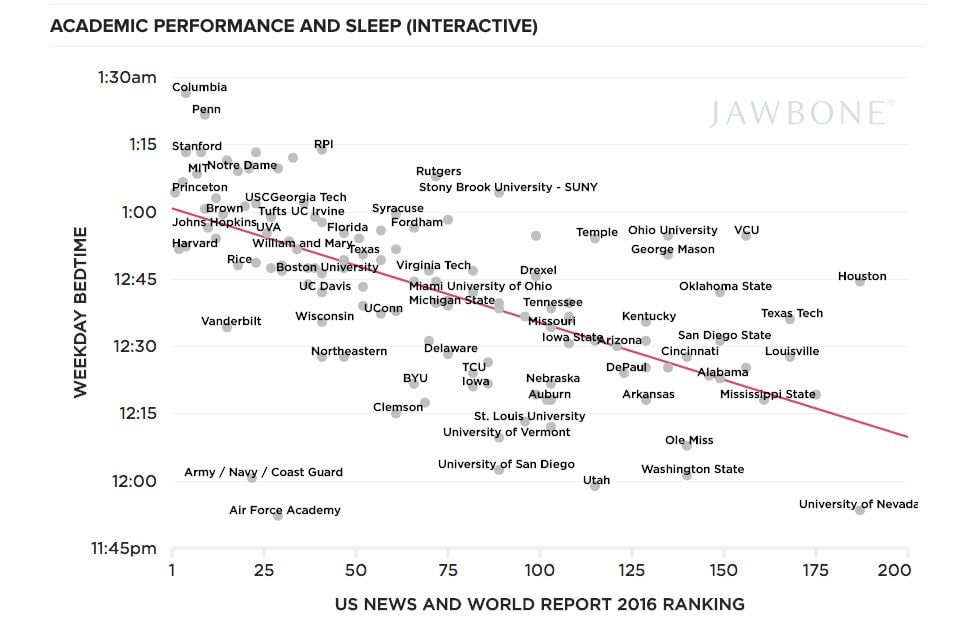Most students at top colleges have the same sleep pattern
Worries that young university scholars are not getting enough rest are probably unwarranted. Students at most schools get the same amount of shut-eye on average—7 hours and 3 minutes— which is within the range recommended by experts. But students at top-ranked schools showed an intriguing pattern: They tend to fall asleep late, after 1 AM, compared to their counterparts further down the rankings.


Worries that young university scholars are not getting enough rest are probably unwarranted. Students at most schools get the same amount of shut-eye on average—7 hours and 3 minutes— which is within the range recommended by experts. But students at top-ranked schools showed an intriguing pattern: They tend to fall asleep late, after 1 AM, compared to their counterparts further down the rankings.
Those are the findings from Jawbone, a wearable device company crunching the data on about 18,500 students wearing its UP wristbands. They analyzed sleep patterns over 1.4 million nights at 137 schools since 2013.
The data showed a strong correlation between a school’s 2016 ranking in US News and World Report and student bedtimes. The more elite the college, the later the average bedtime. Columbia students (ranked #4) went to bed latest at 1:26 AM followed by those at University of Pennsylvania (#9), Stanford (#4) and Duke (#8). The earliest bedtimes were for those at the University of Nevada (#187) at 11:54 PM. The military academies were considered a special case given their mandatory schedules. They created an interactive chart to see every school’s data in the study.

Researchers said the data raised an intriguing question as it was bedtimes, not total number of sleep hours, that showed a relationship to a school’s academic rigor. ”I haven’t seen anything like this before,” wrote Jerome Siegel, a professor of psychiatry at UCLA’s Semel Institute of Neuroscience and Human Behavior, by email. “More interesting than the late sleep onset times is the lack of difference in sleep duration.”
One possible explanation is that students who go to sleep later are using their time differently or fitting more into their days. Previous research suggests that adolescent sleep cycles tend to favor waking up later for better academic performance and health. Some college students may have stayed up late in high school to accomplish what was necessary to get into an elite college and they are continuing those practices in college.
“It makes a lot of sense to me,” said James Gangwisch, a sleep researcher and assistant professor at Columbia University Medical Center, in an interview. “These [higher-ranking] schools are demanding and harder to get into so perhaps the students they get are used to living on less sleep, trying to pack more into the day.”
He was careful to point out that the results did not show causation—that late bedtimes will not gain students entry to tougher schools—nor did they point to higher intelligence per se. “I wouldn’t see as causative [of better academic performance],” he says. “If you get good adequate sleep, it helps with memory, ability to focus, creativity, and using the brainpower you’re endowed with. As much as possible, you want to get adequate sleep, and that amount varies by individuals.”
There are plenty of confounding variables to consider before reading too much into the data. It’s possible the schools with high commuting populations or different scheduling policies would skew the results (larger state schools tend to schedule evenly throughout the day). The study was also limited to those wearing Jawbone’s tracker, potentially adding a bias toward those interested in a wearable device.
The image above was taken by hackNY.org and shared under a Creative Commons license on Flickr.